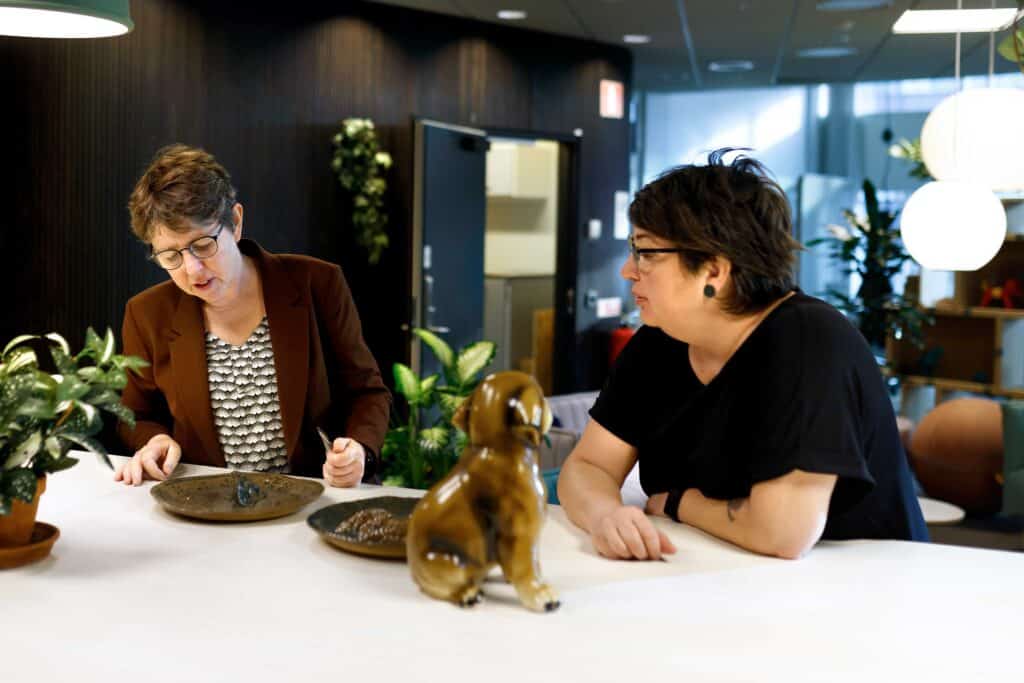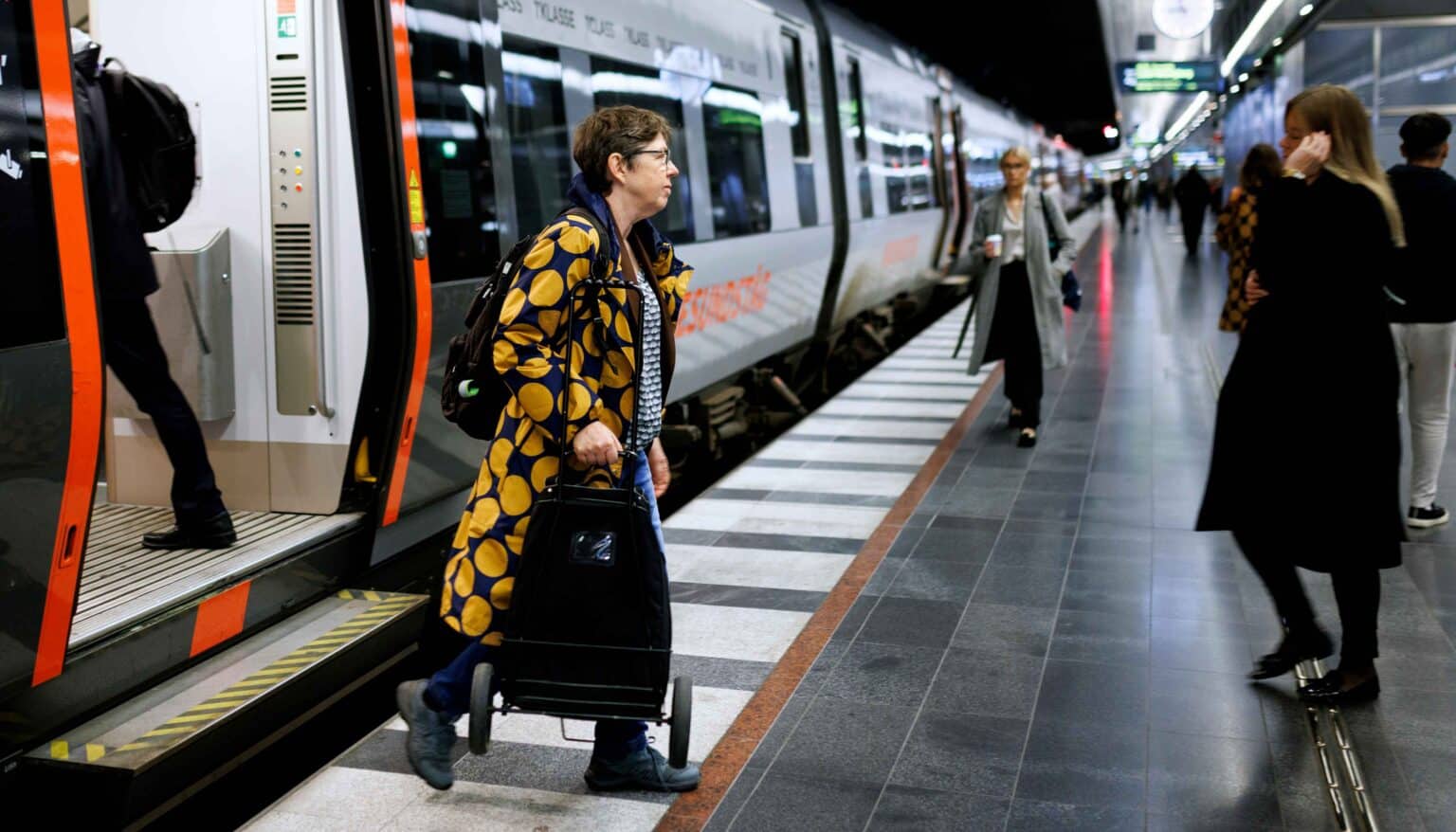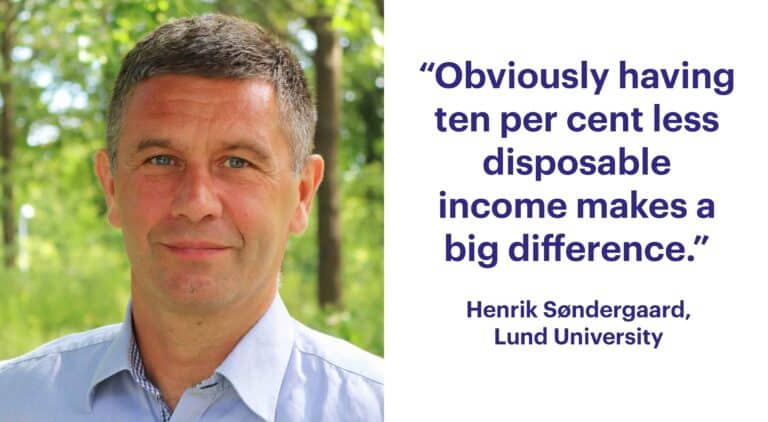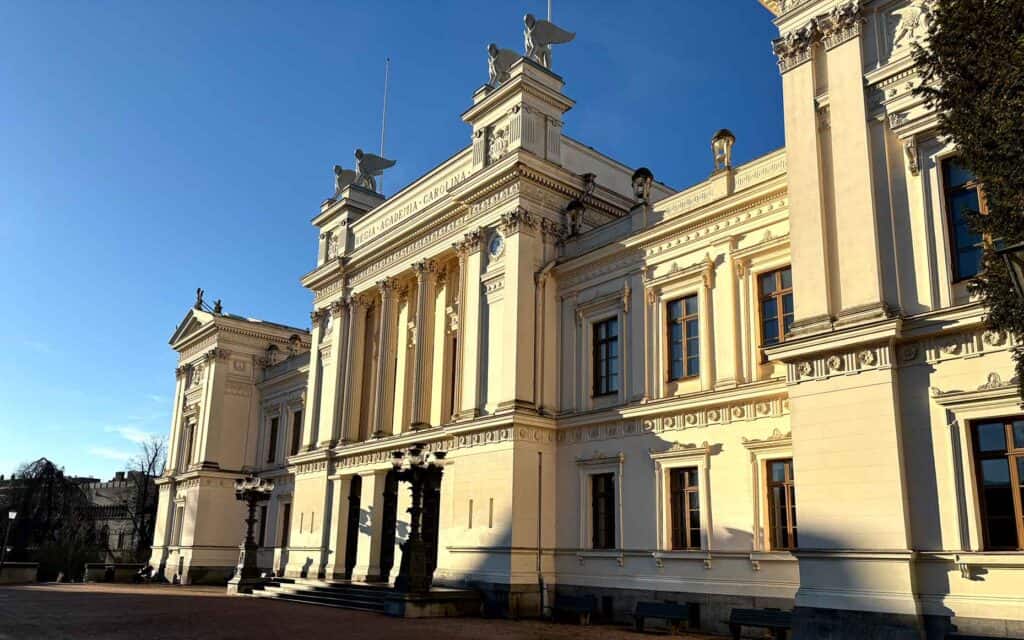A couple of stops on the train before the Öresund Bridge on the Danish side lies Tårnby. Åsa Harvard Maare, a senior lecturer at Malmö University, takes the stairs down to the platform to jump on the morning train to work.
She manoeuvres her trolley bag but doesn’t need any help. It is empty and will be filled with groceries on the way home. They are so much cheaper in Sweden.
On one side of the station is a leafy residential suburb and terraced houses, on the other are classic grey high-rise buildings. There is a sports arena here, where construction fences and a half-finished stretch of apartments show that reconstruction is ongoing. The project is to be completed in 2024. In addition to the clubhouse and changing rooms, the sign outside says there will be housing for young people and people with low incomes.
Researchers and university teachers who live in Denmark but work in Sweden hardly qualify for the low-income category. But as the Swedish krona falls, they have less and less salary left to live on each month.
“It’s little things that kind of end up not being so little,” says Maare. “We have a wellness allowance of SEK 3,500. I’m a member of a gym and pay 329 Danish kroner a month, and last time that was 530 Swedish kronor.”
When the family first moved across the Öresund Bridge from Malmö ten years ago, the difference was not very big. It went up and down a bit, she remembers. Ten years ago, you paid 1.15 Swedish kronor for one Danish krone. Now it is approaching 1.60.
“In the past few years, I’ve noticed that I get significantly fewer Danish kroner when I transfer money.”
Åsa Harvard Maare
“In the past few years, I’ve noticed that I get significantly fewer Danish kroner when I transfer money. We need to think about keeping expenses down and I can’t save as much as I used to.”
Maare is not having sleepless nights over her financial situation, but she knows that other colleagues are finding things harder. “Our salary increases are two or three per cent, but no one compensates us for a ten per cent currency exchange loss.”
The train carriage is almost as empty as her trolley bag. Most commuters travel in the opposite direction. Åsa Harvard Maare takes a window seat and opens her laptop.
Tårnby station, half a mile outside central Copenhagen, is a ten-minute walk from her home. She is a Swedish citizen, but when her children grew a little older, it was a natural step to move to Copenhagen, where her husband has relatives. He and their children are Danish citizens.

She has worked at K3, the Department of Arts, Culture and Communication at Malmö University, since 1999. This afternoon, she will have her first salary-setting dialogue with her manager. She has just recently taken up the position as head of unit. Becoming a manager was not a goal, but it was a natural step when the opportunity arose, she says. The position means a salary increase. That was not an unimportant factor in her decision to accept the role.
Jens Pedersen, a senior lecturer in interaction design, is sitting in a lunch restaurant near the university in Malmö. Before lunch, he was planning teaching together with a couple of colleagues, who are now sitting a few tables away. That afternoon, he has tutorials for students.
He is a Danish citizen and started commuting across the bridge to Malmö University and K3 in 2017. Before that, he was as a postdoc at the IT University in Copenhagen. He also spent four years away from academia, working at a company in the Danish town Aarhus.
“This was an opportunity to have permanent employment, which was important. The environments here are very specialised, especially in my field, so having the chance to work with this is unique. K3 is actually kind of unique, and it feels right for me.”
Pedersen lives with his partner and her two children in an apartment in Copenhagen. The children live with their father every other week. Jens has calculated how much his salary has decreased in value as a result of the falling Swedish krona.
In addition, he tells us, the SINK tax, which is a special income tax that those who live in Denmark and work in Sweden can choose instead of normal income tax, has been increased from 20 to 25 per cent.
“In reality, my salary is about 20 percent lower today than when I started when you take the exchange rate and tax into consideration.”
Jens Pedersen
“In reality, my salary is about 20 percent lower today than when I started when you take the exchange rate and tax into consideration. Then there is inflation, but that obviously applies to everyone, Swedes and Danes alike.”
To be able to afford to live in Copenhagen, Pedersen needs to take additional work in Denmark. This summer he worked as an external co-examiner at several Danish universities. It can be hard to fit everything in. “Working 120 per cent is a lot. I was working 50 hours a week in June.”
His partner works in theatre in Denmark, which means a variable income, as he describes it. This year, they didn’t go away on holiday because the family couldn’t afford it. But the children did go on holiday with their father at least. They are now trying to save up for next summer, and in January he will start working a second job again.
Pedersen is not sure that his work situation is sustainable in the long run. “We’ll see. I don’t think I’m the only commuter thinking about finding a job in Denmark instead. But I’m very happy here and enjoy being in a Swedish work environment.”
He describes an interdisciplinary environment with colleagues he appreciates. And a difference between higher education in Sweden and Denmark that draws him to Malmö is that Sweden has a freer attitude, while universities in Denmark are run more top-down.
“It’s difficult to explain, but my feeling is that Danish universities are run a little more like businesses, with key performance indicators and that kind of thing. Here, I get to help set an agenda with a freer framework.”
Åsa Harvard Maare sits down with a coffee on the terrace of the break room, with a view of the Turning Torso skyscraper and the Öresund Bridge on the horizon. Unlike Jens Pedersen, who is thinking about getting a permanent job in Denmark, she sometimes thinks about moving back to Sweden. “I live in Denmark and like it, but I am still very Swedish. And I have children who like everyday food like Skogaholm bread and Bregott.”
In a way, she is still – literally as she says – right on the border. But her children go to school in Denmark and her husband works there.
“In the future, I need to try to understand how my Swedish pension will be taxed. I have a bad feeling about how it might be taxed in Denmark. So I’m considering getting a house or flat in Sweden and moving back, if I can find a way to make it work while the rest of the family lives in Denmark.”
They want to be in Denmark. Because they are Danish. But she is actually fortunate compared with many other commuting colleagues, she says. Having at least one Danish salary in the family helps.
Universitetsläraren has spoken to other bridge commuters, who describe how difficult it is to pay their mortgages or to afford anything other than bills. Some take extra jobs to make ends meet. Sick leave has started to increase, one told us.
“A lot of people are struggling and it’s difficult to maintain motivation levels when the currency rate difference is this big. We’ll never ever be able to compensate staff for that.”
Helena Ondrus
Helena Ondrus is acting head of K3’s design unit. She feels frustrated and worried. “A lot of people are struggling and it’s difficult to maintain motivation levels when the currency rate difference is this big. We’ll never ever be able to compensate staff for that.”

Her unit will be hit hard if people start quitting. Stress and sick leave are not far away in some cases, she says. “If it continues like this, we’ll lose a lot of people, and some of them have been working here for ten years. We’re talking about programme coordinators or research project leaders.”
Åsa Harvard Maare is now at her desk and starts up her computer. She appreciates having her own workspace. Another advantage of being a manager. Although she prefers to express herself as an employee, she steps into her new role for a few minutes.
As salary increases are part of a system we will have ”forever”, it is not possible to compensate people for things that fluctuate, she says. “Salaries are set solely and exclusively according to employees’ performance and results. Not on the basis of feeling sorry for them.”
On the other hand, she would like the employer to be able to offer incentives other than salary increases. For example a temporary expansion of research hours as part of their working time.
Jens Pedersen thinks that the employer should consider temporarily allocating targeted funding to Danish commuters as a group.
But he realises that would be difficult. “I understand that it can be regarded as our problem that we live in Denmark. And if the university has the same total budget for salary costs, our Swedish colleagues would receive less than today. So obviously it’s difficult. Also, that’s probably not a situation we want to put ourselves in, employees fighting against each other.”
He also realises that a state-sector employer needs to comply with state-sector collective agreements, and to be aware of the risk of breaking laws against discrimination. When it comes to politics, he wants the SINK tax to be reduced. It was lowered from 25 to 20 per cent in 2014, but four years later it was raised back to 25 per cent again. “This is not just a problem here in Malmö,” he adds. “There are certainly other border towns with similar challenges.”
He feels that the trade union has not been very interested in the issue. “If, for example, you are discriminated against because you are a woman or have a foreign-sounding name, those are clear cases of discrimination. Living in a different place is a different kind of discussion, so I think that makes the issue too complicated.”
Micke Svedemar, a national officer at SULF with responsibility for the higher education institutions in southern Sweden, has previously worked at K3. “The problem is that employees don’t get paid according to their needs,” he says. “Salaries must be linked to performance and duties. Having said that, we now have a situation where the Danish krone has become so expensive that SULF members who live in Denmark have had a substantial pay cut.”
The feeling is, Svedemar continues, that the limit has been reached for whether a Swedish salary is high enough to pay Danish bills.
All that remains then is to look for another job. “These highly-educated employees, with long academic backgrounds and who often have key positions at Swedish universities and colleges – when they are forced to leave because they cannot afford to continue working in Sweden, that’s when we will feel the impact.”
Research projects that cannot be conducted and narrow and highly specialised subject areas where it will be difficult to fill the vacancies left by those who leave are a couple of the examples he talks about. “It’s an international market. And if you want to retain these employees, perhaps you shouldn’t talk about salaries at individual level, but look across the whole group. If the employer cannot bring in someone else when people quit, they need to work with other mechanisms.”
Malmö University has raised the issue of tax regulations with politicians in the Öresund region, says Annika Olsson, Dean of the Faculty of Culture and Society.

Annika Olsson
Dean, Malmö University Photo: Emma Larsson
She emphasises that the employer is aware that the situation is challenging for many employees, but also that salary policies and collective agreements cannot take into account where someone lives or currency exchange rates. “Then we might have to do the same thing in the other direction. When the Swedish krona gets stronger and you benefit by living in Denmark, will they then pay money back? We can’t have such systems at the organisational level. The strength of the Swedish currency is a matter for our government to take care of. We need to work in other ways.”
Olsson is aware that staff may leave if the problem is not resolved. And that the university will then lose competence that may be difficult to replace. “Of course it’s a problem. Both for them as individuals and indirectly for us.”
Åsa Harvard Maare is doing some final preparations for her salary-setting dialogue. No employees in her group commute across the bridge, she says, and brings up another problem.
According to the Öresund Agreement, a special tax agreement between Sweden and Denmark, people who live in Denmark and work at least 50 per cent of their total working hours in Sweden over a three-month period do not have to pay tax in both countries. The problem is that the agreement does not apply to public employees.
“That’s just stupid, and it’s time that exception was removed.”

















